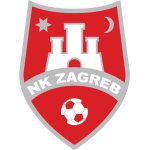| Coach | NA |
| Venue | Stadion Kranjčevićeva |
NK Zagreb predictions
Predictions for NK Zagreb: See upcoming and historic predictions for NK Zagreb below.
Disclaimer: Past performance does not guarantee future results. Betting involves risk; only wager what you can afford to lose. Always gamble responsibly.
NK Zagreb latest results
NK Zagreb latest transfers
| Date | Player | From | To | Price |
|---|---|---|---|---|
| 2015-08-30 | F. Krovinović | NK Zagreb | Rio Ave | € 800K |
| 2013-01-01 | M. Pavlović | NK Zagreb | Werder Bremen | € 650K |
| 2011-01-29 | V. Celjak | NK Zagreb | Sampdoria | € 500K |
About NK Zagreb
NK Zagreb, short for Nogometni Klub Zagreb, is a professional football club based in Zagreb, Croatia. The club was founded in 1908, making it one of the oldest football clubs in the country. The team's home ground is the Stadion u Kranjčevićevoj, which has a seating capacity of 8,850.
NK Zagreb has a rich history, having competed in the top tier of Croatian football, the Prva HNL, for many years. The club's most successful period came in the late 1990s and early 2000s. In the 2001-2002 season, NK Zagreb won the Prva HNL, marking the first and only time the club has won the Croatian top division. This victory was a significant achievement, as it broke the dominance of the two most successful clubs in Croatia, Dinamo Zagreb and Hajduk Split.
Over the years, NK Zagreb has produced many talented players who have gone on to represent the Croatian national team. Some of the most notable players include Dario Šimić, who had a successful career playing for clubs like Inter Milan and AC Milan, and Josip Šimunić, who represented Croatia in three World Cups.
Despite its past successes, NK Zagreb has faced challenges in recent years. The club has struggled with financial difficulties, leading to relegation from the Prva HNL. In 2014, NK Zagreb was demoted to the third tier of Croatian football due to financial irregularities. Despite these setbacks, the club continues to compete and has a loyal fan base.
NK Zagreb's traditional colors are white and blue, and their nickname is "The Poets" (Pjesnici). The club's crest features a white football on a blue background, with the club's name and founding year displayed prominently. Despite the ups and downs, NK Zagreb remains an important part of Croatian football history and continues to contribute to the development of the sport in the country.
















